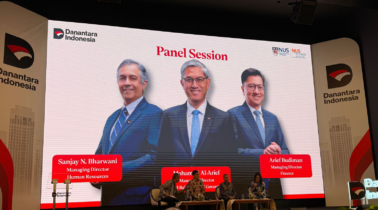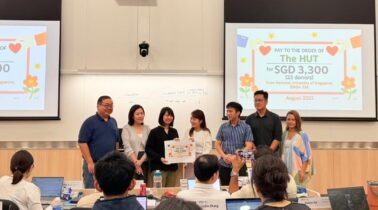Data to Dining: How Gennadii Bochkar is Building Asia’s “Culinary Staycation” Group
When asked what advice Gennadii Bochkar has for those considering the NUS Executive MBA (EMBA) programme, he replies with conviction. “You’ll get as much as the effort you put in and how smartly you take advantage of it. Do your homework. Think ahead: what are your KPIs for a successful EMBA? You’ll probably redefine them along the way, but having clarity helps. And always ask if it’s aligned with your long-term dream.”
For him, that alignment was clear. “I chose NUS EMBA because it’s based in the heart of Asia, and I’m on a mission to grow across Southeast Asia.”
With this clarity, it’s no wonder that Gennadii, a current candidate in the 2025 program, has charted an unusual but successful culinary journey. Most people think of food and beverage entrepreneurs as seasoned chefs or hospitality veterans. For Gennadii, the journey was far less traditional. After nearly a decade in data analytics, working with Fortune 500 brands in China, he traded reports and insights for restaurants and brand experiences. Today, he is Founder & CEO of BIBIMI F&B Group, operating in both Singapore and Shanghai.

From Analytics to Entrepreneurship
Gennadii’s goal is to shape what he calls Asia’s first “culinary staycation” group. So what exactly is a “culinary staycation”? Gathering from his story, it becomes clearer.
In 2016, while still working at Meltwater, Gennadii co-founded BIBIMI. By day, he continued in corporate analytics; by night, he experimented with restaurant concepts. Drawing on years of social media listening and consumer insight, he and his co-founders launched their first brand, Bites & Brews, in Shanghai’s Jing’an district.

This decision to step into entrepreneurship was driven less by ambition than by the urge to create. The method was simple but effective: standing on the corner of Wuding Road and Jiaozhou Road, they handed out beers, intercepted passersby, and ran informal surveys. “No arrogance. Just real data and a real understanding of the community,” he says. “We listened closely and built a concept around needs people didn’t even know they had.”
“I never really left analytics,” he reflects. “I just started using it differently — always asking: what do people want before they know they want it?”
Expansion Aided by the EMBA Advantage

When BIBIMI expanded into Singapore in early 2024, Gennadii faced an un
expected challenge: what had resonated with consumers in Shanghai did not translate easily in Singapore. “People here noticed different things, responded in different ways. Our positioning felt unclear,” he explains.
It was a fortunate coincidence that his first NUS EMBA class was Marketing Strategy with Professor Prem Shamdasani. “That course was an absolute goldmine,” Gennadii recalls. Armed with fresh frameworks, he conducted a brand perception audit, analysing Google reviews, offline feedback, and customer conversations. The findings allowed him to sharpen the brand’s positioning and messaging for the Singapore market.

What stood out most for Gennadii was the EMBA’s ability to apply lessons immediately. “As founders, we have the luxury of testing and implementing changes across departments in real time. That’s powerful. And if you’re in F&B, with physical outlets, it’s even more special — your restaurants become living case studies for your classmates and alumni community.”
The impact of his first class was immediate. Foot traffic and engagement improved. More importantly, the group made a pivotal decision: to unify all its concepts under one clear mission to become Asia’s leading “culinary staycation” group.
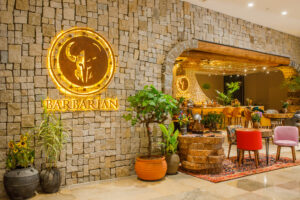
Gathering from his response, a culinary staycation is not merely about eating out. Restaurants like Barbarian and Nomad aim to “transport you somewhere — a different country, a different time, even a different mood.” In other words, BIBIMI’s restaurants are designed to offer guests a brief escape from everyday life.
“That first class was unforgettable. I felt the power of the EMBA right away,” Gennadii reflects.
Where Data Meets Dining
When asked about the role of AI in his business, Gennadii lights up. “I love this question,” he says. “Because this is exactly where data, technology, and creativity converge, and that’s the space I enjoy most.”
For him, there is no conflict between AI and hospitality. “Restaurants are one of the most labour-intensive industries, and ironically, the thing customers value most in casual or fine dining is the human touch. We don’t see AI as a threat to that. Instead, we use it to free up our people for what matters: creativity, quality, and guest experience.”
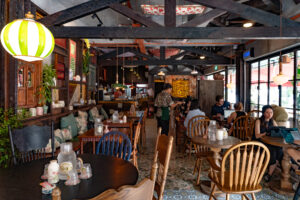
At BIBIMI, AI has become integral to both creativity and operations. It supports menu innovation. “I’m not a chef, but with AI and imagination, I can co-create with my team to design dishes that are trendy, cost-effective, and aligned with our brand”, — and helps analyse social trends that inspire new flavours and presentations. On the operations side, AI now handles inventory, recipe documentation, and staff scheduling in hours instead of days.

The turning point to integrate AI into all of these, he says, was the EMBA. “Before, these were scattered experiments. The EMBA gave me the frameworks to turn them into a core business strategy.” Courses like AI Opportunities with Professor Tan Hong Ming broadened his view of how AI could transform business far beyond dashboards. Looking ahead, he is eager to take Technology, Innovation & Entrepreneurship with Professor Virginia Cha. “I know that course will help me push this even further.”
What excites him most is how it has shifted his role. “With AI, I’ve been able to shift from a CEO focused on managing operations to a CEO acting as product manager for the brand experience. That’s where I want to be. The EMBA gave me the confidence and tools to make that leap.”
Rethinking Leadership
Leadership was another area of transformation. In the Service Management course with Professor Jochen Wirtz, Gennadii came to see customer experience not as an afterthought but as a strategic asset. “During a group project on loyalty, my peers challenged me to go deeper. We uncovered that true loyalty isn’t built on discounts or points, but on core experience and love, why people chose you in the first place.”
This discovery humbled him. “I didn’t fully like myself as a leader before the classes started,” he admits. “I had been too focused on fixing problems and pushing efficiency, without recognising positives or empowering the team.”
Today, he emphasises empowerment over control, pairing operational excellence with what he calls “emotional excellence.” One memorable outcome is the creation of the Culinary Staycation Index (CSI). A tongue-in-cheek name, but a serious measure of how well the dining experience reflects the group’s mission of offering guests a mini-vacation.
Among the most defining moments of his EMBA leadership journey was the Mumbai immersion, particularly a conversation with Suresh Narayanan, Chairman of Nestlé India, who shared how he led through the Maggi noodles crisis. “He said, ‘You don’t have to be loved as a leader, but you must be trusted.’ That stayed with me,” Gennadii recalls. Hearing from Ravi Kant of Tata Motors further reinforced the idea of “leading from the back.”
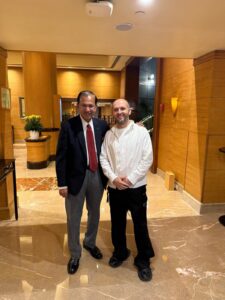
These lessons crystallised into what Gennadii now calls Presence Leadership. It involves being present at every level, working hand-in-hand with teams, providing support from the back, and leading from the front with vision and trust.
Advice for Future Candidates
We asked what other advice he had for future F&B founders considering the EMBA.
Apart from clarity on what they want from the programme, he stresses that openness is essential. “If you think you’re already perfect, don’t come. Your ROI will be minimal. But if you’re even slightly open, the program gives you a lot. People will challenge you — sometimes you won’t see the change immediately. But the transformation is real.”
He also highlights the value of how well the programme is run. “The NUS leadership and EMBA team do an excellent job. The program runs so smoothly, you almost take it for granted. But when you think about how much work goes into it from speakers to immersions to feedback loops, it’s impressive.”
For Gennadii, the EMBA has broadened his perspective, sharpened his strategy, and connected him to a network that extends far beyond the classroom. “NUS EMBA broadens your lens. You start to see the bigger picture in all the chaos, especially across Asian markets.”
And his final advice is simple: enjoy it. “Someone in the MBA program joked that EMBA candidates are loud and outgoing, probably because we’re finally learning what we need, at a time in life when we want it. You’re not here to chase grades. You’re here for growth. And you’ll remember this time with a smile, so enjoy it.”
Ready to Take the Next Step like Gennadii?
From data analytics to culinary innovation, from Shanghai street surveys to Singapore expansion, Gennadii Bochkar’s story shows how insight, imagination, and the right EMBA program can transform a vision into reality. Today, BIBIMI is a vision of what food tech, creativity, and hospitality can achieve together.
For founders and executives ready to take the next step, the NUS Executive MBA offers not just tools, but the frameworks, community, and perspective to lead with clarity in a complex world. Find out more about the NUS EMBA here.

